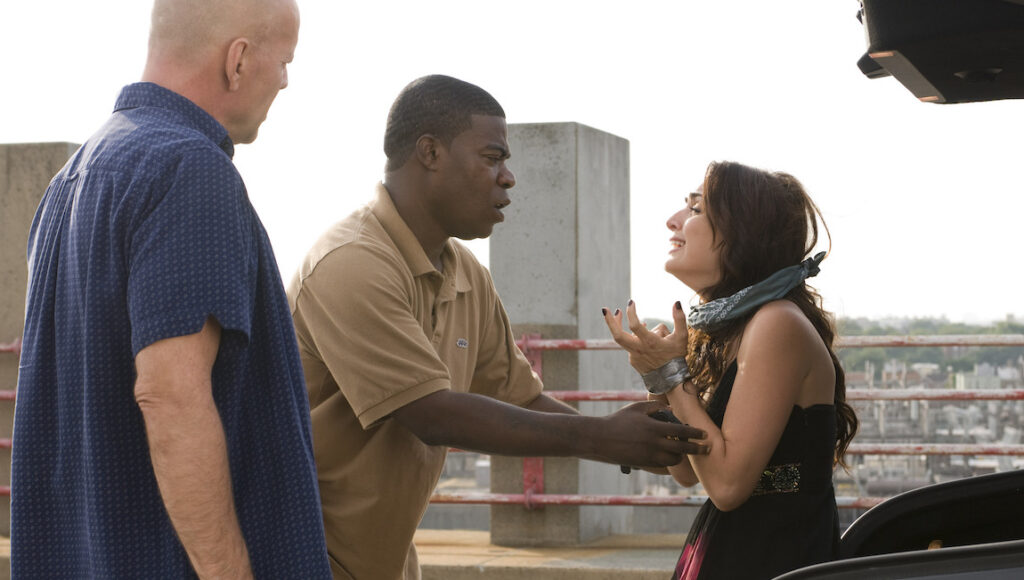There’s something to be said for the achievement of a modest goal. Kevin Smith has stated that his reasoning behind directing Cop Out was that he wanted to make the kind of film his father liked. An ambitious aim, it isn’t. But it’s an honest one, and Smith makes an honest attempt at it, which works to his rickety film’s advantage. The Smith patriarch, it seems, was very much a fan of the eighties cop farce, where brusque punchlines and overexcited acts of violence dueled for face time. It’s a well-mapped formula, and Robb and Mark Cullen’s script follows it to a fault. Unorthodox yet dedicated policemen Jimmy Monroe (Bruce Willis) and Paul Hodges (Tracy Morgan) go outside the law to crack a drug-running case even though they’ve been suspended by their superior. The other cops on the case would like nothing more than to see these two hambones derailed; both have various issues that distract them from doing their job (Jimmy has to find a way to pay for his daughter’s blowout dream wedding and Paul is riddled with doubt over his wife’s fidelity). Add comedy and action in equal, liberal doses and you’ve got yourself a movie.
This moribund genre has hidebound structures, and Cop Out is nothing if not true to them. I’d love to say that it’s an exemplary specimen, but at its best, it’s merely middling. Smith’s bread-and-butter has always been the sharply obscene repartee between his characters, and while he didn’t write this, the scatological/vulgar bent of the dialogue feels like something to which he’d be attracted. There are a fair handful of amusing moments (Smith regular Jason Lee delivers a monologue that’s funny in a cruel, cutting way Smith rarely allows himself to be), but there’s also a disconcerting amount of dead air, during which clumsy attempted laughs fall to the firmament with a thunderous thump. Attempts at character quirks, like lead villain Poh Boy (a committed Guillermo Diaz) and his baseball fetish, are invariably ill-advised, and anything that happens when Seann William Scott’s tiresomely manic parkour enthusiast is on screen is all desperation.
If the comedy is clumsy, the action trips over its own feet. Anyone who’s been following Smith’s career to some degree has to know, at this point, that he’s not much of a visual director. Which is why his decision to helm an action-comedy is a bit puzzling. During Cop Out‘s climax, Jimmy and Paul get their chance to right all wrongs perpetrated against them (and the state of New York), and it’s almost wholly action-oriented. While Smith has progressed since Dogma, he’s not yet equipped himself with the skill to craft the visceral thrills demanded by this genre—his coverage is atrocious and his editing is generically frenetic, using chaotic motion to hide the fact that the action is poorly choreographed. I admire that he’s trying to stretch out and do something different, and I appreciate that he’s got an army of actors and technicians willing to support him. But he’s still out of his league.
Yet the film works, to a degree. For all its faults, Cop Out is an entirely sincere effort of homage. The Cullens’ script makes this clear from the outset, with Morgan declaiming at top volume about the artistic intent of the cinematic impersonations he uses as an interrogation technique; although that strikes me as way too on-the-nose, the very same scene has a far slyer announcement of intention in Paul’s nine-year anniversary card to Jimmy. Much as Morgan’s ramshackle personalizing of an existing structure is done solely to get a chuckle from his partner, so do the makers of Cop Out utilize familiar tropes simply because they think there might still be some cheap, breezy entertainment in there. While others might succumb to the lure of irony, to show that they’re above this low-grade dross, Smith and company are happy to believe in it. They love the clichés and the shtick and the comfortable predictability of it all, and darn it if they aren’t going to try to make the most of this shopworn enterprise. (Hell, for the sake of authenticity, they drafted Harold Faltermeyer to provide the requisite synth-laden score.) The key to working in genre is not to act like you’re slumming. Unlike, say, the painfully post-modern kitsch fuck explosion that is Bitch Slap, nobody in Cop Out acts like they’re slumming. So that’s a plus.
Furthermore, if Smith can’t bring an action director’s touch to the table, what he does add to Cop Out is his typical slacker enthusiasm. There’s a looseness that can’t be faked here, a shaggy sense of amiability that redeems quite a lot of the film’s sins. In particular, this approach allows Willis and Morgan to forge what by film’s end becomes genuine chemistry. They’re both playing to type — Willis is the business-first hard-ass, Morgan is the distractible goofball who nonetheless is a stand-up friend, coming through in a pinch — but they’re each given enough space to push past those types and show us what’s kept them functioning as a proper unit over the years. Morgan’s gesture in the film’s last scene especially has the potential to play as crass, so it’s to his and the script’s credit that we believe it as a sign of earnest male bonding. What we’re left with in Cop Out amounts to a film that isn’t particularly good; it’s not as funny or as exciting as it seems to think it is. On the other hand, it is good-natured and respectful to its forbearers, enough so that its flaws don’t seem to matter as much. If I were to ask myself if Cop Out does what it set out to do, the answer to that question would be a guarded but a definite yes.


Comments are closed.